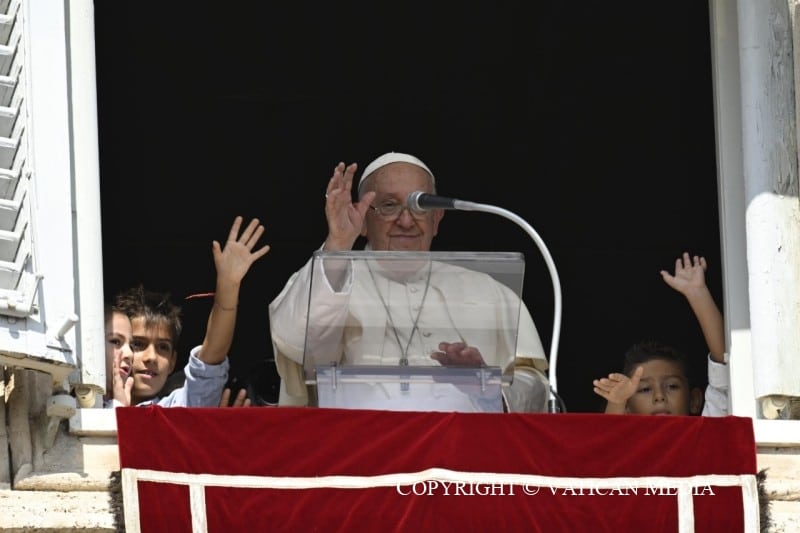The Pope’s words at the Angelus
At 12 noon today, the Holy Father Francis looked out of the studio window in the Vatican Apostolic Palace to pray the Angelus with the faithful and pilgrims gathered in St. Peter’s Square.
At the end of the Angelus prayer, five children representing the five continents were present at the studio window. The Holy Father wanted them beside him to announce his meeting with children from all over the world, sponsored by the Dicastery for Culture and Education, which will be held next 6 November in the Paul VI Hall, on the theme “Let us learn from boys and girls”.
These were the words of the Pope in introducing the Marian prayer:
Before the Angelus
Dear brothers and sisters,
Today, the Gospel speaks about two sons. Their father asks them to go to work in the vineyard (cf. Mt 21:28-32). One of them responds “yes”, right away, but then does not go. The other, says “no”, but then repents and goes.
What is there to say about the behaviour of these two? What quickly comes to mind is that going to work in the vineyard requires sacrifice, and sacrifice costs. This doesn’t come naturally, even with the beauty of knowing they are sons and heirs. But the problem here is not so much connected that they resist going to work in the vineyard, as much as their sincerity, or lack thereof, with their father and with themselves. Even though neither of the sons behaves impeccably, one lies, while the other makes a mistake but remains sincere.
Let us look at the son who says “yes”, but then does not go. He does not want to do the father’s will, but neither does he want to get into a discussion or talk about it. Thus, he hides behind a “yes”, behind a false willingness that hides his laziness and he saves face for the time being. He is a hypocrite. He gets by without conflict, but he cheats and deceives his father, disrespecting him in a way that is worse than had he responded with a blunt “no”. The problem with someone who behaves like this is that he or she is not a sinner, but is corrupt because they lie with no difficulty to cover up and disguise their disobedience without welcoming any honest dialogue or feedback.
The other son, instead, who said “no” but then went, is sincere. He is not perfect, but sincere. Certainly, it would have been nice to hear him say “yes” right away. That did not happen, but at least he shows his reluctance clearly and, in a certain sense, courageously. That is, he takes responsibility for his behaviour and acts out in the open. Then, with this basic honesty, he ends up questioning himself until he understands he has made a mistake and retraces his steps. He is a sinner, we could say, but he is not corrupt. Pay close attention to this: this son is a sinner, but he is not corrupt. And there is always the hope of redemption for a sinner; for the corrupt, instead, it is much more difficult. In fact, the corrupt person’s false “yesses”, elegant but hypocritical façades and habitual false pretenses, are like a thick “rubber wall”, behind which to take cover from qualms of conscience. And these hypocrites do so much evil! Brothers and sisters, sinners yes – all of us are – corrupt no! Sinners yes, corrupt no!
Let us look at ourselves now and, in the light of all this, ask ourselves some questions. When faced with the difficulty to live an honest and generous life, to dedicate myself to the will of the Father, am I willing to say “yes” each day, even if it costs? And when I fail, am I sincere before God about my difficulties, my failings, my weaknesses? And when I say “no”, do I turn around after? Do we speak with the Lord about this? When I make a mistake, am I willing to repent and retrace my steps? Or do I pretend everything is okay and go through life wearing a mask, concerning myself only about appearing good and righteous? Finally, am I a sinner, like everyone, or is there something corrupt in me? Do not forget: sinners yes, corrupt no.
May Mary, mirror of holiness, help us be sincere Christians.










